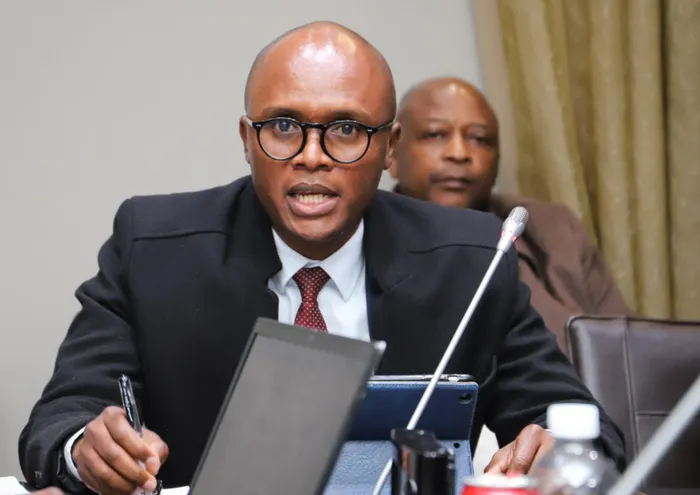G20 Summit: South Africa's vision for a digital economy

Communications and Digital Technologies Minister Solly Malatsi says digital connectivity has the potential to deliver transformative economic empowerment.
Image: X
Minister of Communications and Digital Technologies, Solly Malatsi, believes that digital connectivity has the potential to deliver transformative economic empowerment.
Malatsi said this will allow South Africans to learn new skills and expand access to economic opportunities.
The future of the digital economy and AI innovation is about to unfold at the G20 Summit in Johannesburg in November.
The summit takes place when the world faces interconnected challenges, including climate change and its impacts such as extreme weather and food insecurity, economic instability such as inflation and poverty, health crises like pandemics, growing income inequality and societal polarisation, and threats from conflict, emerging technologies, and the erosion of truth and democracy.
Digital economies and innovation are expected to offer solutions by increasing access to essential services such as education and healthcare, fostering sustainable development through optimised resource management, creating new job opportunities and economic growth, and improving global connectivity and collaboration.
Technologies such as broadband internet, AI, and digital payments enable remote work, precision agriculture, and efficient e-government services, contributing to poverty reduction, environmental sustainability, and enhanced productivity.
Malatsi, who spoke to Independent Media ahead of the summit, previously outlined four strategic focus areas under South Africa’s G20 Digital Economy Presidency. These include connectivity digital public infrastructure (DPI), innovation ecosystems for MSMEs, and ethical artificial intelligence (AI).
Malatsi said the government’s vision is to build a dynamic, inclusive, and globally competitive digital economy that empowers citizens and unlocks opportunities for businesses of all sizes.
He said the government is committed to enabling this future through progressive policies, meaningful connectivity for all, public-private partnerships, digital infrastructure investment, reskilling and upskilling the workforce for the demands of the digital world.
"Digital inclusion is a top priority. We have launched initiatives such as SA Connect and Connect Mzansi, focused on extending broadband to underserved communities, schools, clinics, and public institutions.
"In addition, we are expanding access to devices and digital literacy through partnerships with our entities and the private sector. Digital inclusion is not just about access; it is about meaningful connectivity and participation in the economy and society. We also aim to create a conducive environment for policies that will attract investments and promote competition – starting with a comprehensive review of the legislation regulating activity in the ICT sector," Malatsi said.
Indonesia, during its 2022 summit, stressed the importance of digital connectivity and post-pandemic digital recovery, under the theme "Recover Together, Recover Stronger", emphasising inclusive transformation and digital literacy.
India’s 2023 presidency took bold steps to promote digital public infrastructure as a global good, launching a Global Digital Public Infrastructure Repository to share open technological solutions and knowledge with the world.
Brazil carried this momentum forward in 2024, focusing on digital inclusion, universal and meaningful connectivity, inclusive digital public infrastructure, and AI for sustainable development and inequality reduction.
Although not fully moved to a cashless economy, countries such as Japan, Spain, and France are in the process of increasing digital payment adoption. Between 60% and 67% of people prefer cashless payments in these countries in 2021, according to the World Economic Forum.
Malatsi said South Africa is also making steady progress towards becoming a more cash-lite society, adding that digital payment systems are increasingly being adopted across sectors.
"Innovations in mobile money, banking apps, QR codes, and fintech platforms are driving this change. However, for this transition to be equitable, it must go together with digital access and financial literacy. Instant electronic payment schemes like PayShap are making it much easier for South Africans to utilise digital payment systems," Malatsi said.
He said the government aims to accelerate this trend through regulatory support and improved digital infrastructure, ensuring that all South Africans, regardless of location or income, can participate, and the government will be able to save resources on printing, storing, transportation, and security-related matters.
The minister said that DPI is also essential to building a modern and responsive government, adding that the launch of the Digital Transformation Roadmap for Government is a testament to this.
He said the country is currently laying the groundwork for digital ID systems, secure e-payment platforms, and integrated public service portals.
According to Malatsi, this will create a government that is transparent, citizen-focused, and digitally enabled.
He said this will benefit South Africa through improved service delivery through faster, more transparent public services enabled by data interoperability, economic empowerment by enabling digital entrepreneurship, fintech growth, and digital skills employment, reduced inequality through expanded access to information, digital tools, and markets, and international competitiveness by aligning digital infrastructure and governance with global standards.
He said South Africa is also committed to an ethical AI future that reflects on the country’s identity, values, and constitutional rights.
"We believe that AI should promote human dignity, equity, and inclusion. Our approach prioritises transparency, fairness, and safeguards against bias. In practice, this means ensuring that AI systems are trained to understand our diverse languages, support local innovation, and do not reinforce existing inequalities.
"We are finalising the National AI Policy that will guide ethical development and deployment, informed by local research institutions, global best practices, and public consultation."
During his speech at the G20 Digital Economy Working Group (DEWG) and Task Force on AI in the Eastern Cape on April 7, Malatsi stressed that the digital divide, if unaddressed, will become the new face of global inequality. But if addressed through cooperation, the digital revolution can drive unprecedented inclusion and equity.
Malatsi said this includes bilateral partnerships with countries such as India, China, Brazil, and members of the European Union (EU) on digital infrastructure, skills training, and innovation exchanges.
He said this will also include participation in global platforms such as the G20 Digital Economy Working Group, the UN’s Global Digital Compact process, and AU digital economy initiatives.
manyane.manyane@inl.co.za